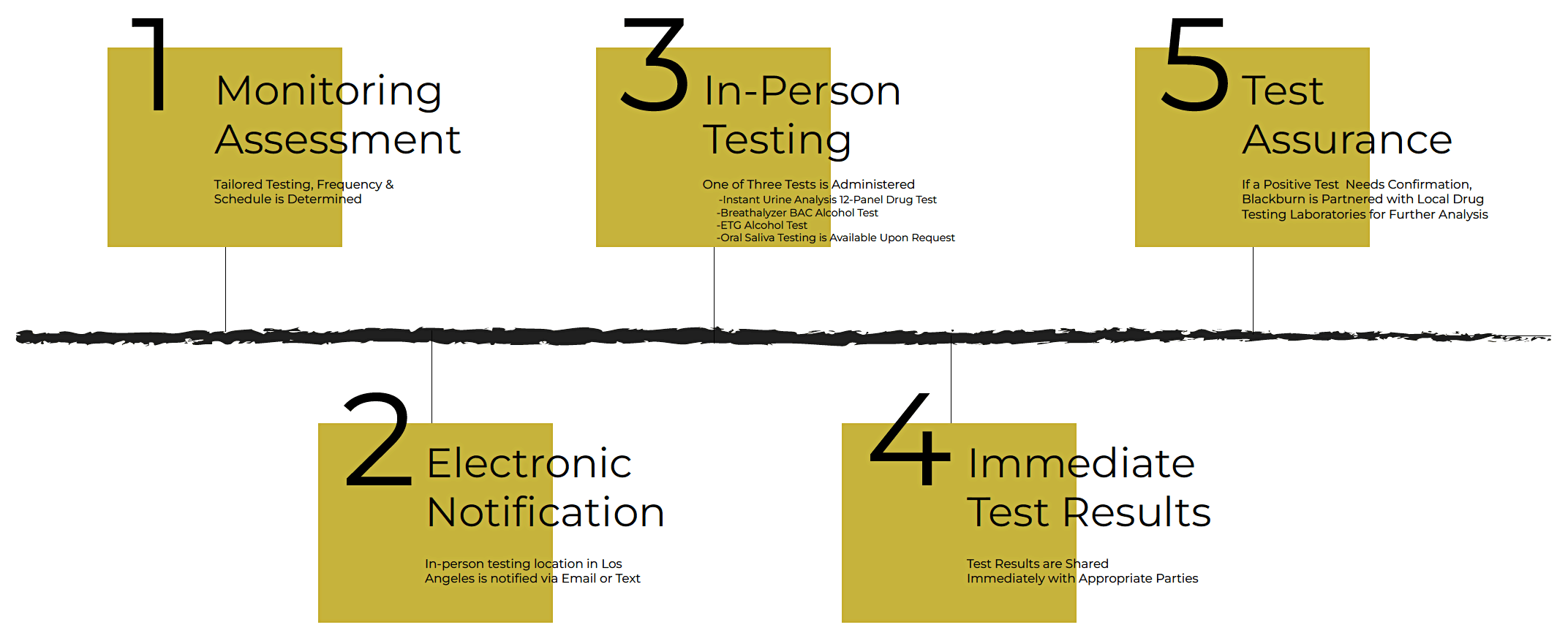COMPREHENSIVE SOLUTIONS & EFFECTIVE RESULTS
DRUG & ALCOHOL
TESTING
MONITORING PROGRESS
PRESCRIPTION
MANAGEMENT
SAFETY
ASSESSMENT
OCCUPATIONAL
HEALTH
SUPPORT AND
INTERVENTION
A JOURNEY TOWARDS RECOVERY WITH MONITORING SERVICES
A JOURNEY TOWARDS RECOVERY WITH MONITORING SERVICES
Whether you're an employer prioritizing a secure workplace, a healthcare professional seeking vital diagnostic insights, or an individual on the path to recovery,our tailored services are here to meet your specific needs.
WORK WITH US
DRUG AND ALCOHOL TESTING
MONITORING PROGRESS
PRESCRIPTION MANAGEMENT
SAFETY ASSESSMENT
OCCUPATIONAL HEALTH
SUPPORT & INTERVENTION
How it works

When monitoring clients, Blackburn Monitoring determines testing frequency on a case-by-case basis, taking into account the individual’s history, treatment goals, legal requirements, and safety concerns. Following this assessment, clients receive electronic notifications indicating when to report for testing at one of our convenient Los Angeles locations.
Our staff administers one of three tests: an instant urine analysis 12-panel drug test, a breathalyzer BAC alcohol test, or an ETG alcohol test (This tests for alcohol use within 72 hours prior to testing.). Oral saliva testing is also available upon request. In the event that a positive test needs confirmation, Blackburn is partnered with local drug testing laboratories for further analysis. Test results can be shared in real time with the appropriate parties.
Our staff at Blackburn Monitoring has extensive experience and training working in the fields of mental health and substance abuse disorders. Blackburn is committed to maintaining balance between effective monitoring and respecting an individual’s privacy and dignity.
MONITORING PROGRAMS PROVE TO DECREASE DRUG USE & IMPROVE QUALITY OF LIFE
57%
LESS DRUG USE FOUND AMONG EMPLOYEES IN THE WORK PLACE
According to a report by the Substance Abuse and Mental Health Services Administration (SAMHSA), drug testing in the workplace has been shown to reduce drug use among employees. In a study, 19.9% who were tested for drugs reported illicit drug use, compared to 46.2% of employees who were not tested. That is a 57% decrease in drug found in the workplace.
43%
DECREASE IN WORKPLACE ACCIDENTS & INJURIES
The American Management Association reported that 62% of companies conduct drug testing on employees, and 43% of these companies saw a decrease in workplace accidents and injuries after implementing drug testing programs.
100%
MONITORING PROGRAMS PROVIDE VALUABLE TOOLS & TREATMENT PLANS
The National Institute on Drug Abuse (NIDA) reports that drug testing can be a valuable tool in monitoring compliance with treatment plans. It can also help identify early signs of relapse, allowing for timely interventions
These statistics and data points demonstrate that drug testing and monitoring can be effective in various contexts, from the workplace to addiction treatment and public safety programs. However, the efficacy of drug testing and monitoring may vary based on the specific goals and strategies employed in each situation.
DECREASE IN OPIOID PRESCRIPTIONS, OVERDOSE DEATHS & STUDENT DRUG USE
Prescription Drug Monitoring Programs (PDMPs) are used by states to track and monitor the prescribing and dispensing of controlled substances. A study published in JAMA Internal Medicine found that states with robust PDMPs saw a significant decrease in opioid prescriptions and overdose deaths.
According to the U.S. Department of Education, schools that implement Random Student Drug Testing (RSDT) programs have reported decreases in student drug use.
IMPROVEMENT IN PATIENT OUTCOMES & A REDUCTION IN HEALTHCARE COSTS
Telemedicine and remote monitoring have become increasingly popular for monitoring patients’ medication adherence and managing chronic conditions. These technologies have shown promise in improving patient outcomes and reducing healthcare costs.
MAKE INFORMED DECISIONS & DETER SUBSTANCE MISUSE
BOOK A CONSULTATION
FAQS
What is monitoring?
Monitoring is a way to improve accountability and support to those
struggling with maintaining abstinence from alcohol or other illicit
substances by offering scheduled or randomized drug and alcohol testing.
Why is drug monitoring/testing important?
Drug testing is important for several reasons, and its significance varies depending on the context in which it is applied. Testing can create a safer work or home environment, improve the productivity and performance of students and employees, deter abuse in high risk populations, and offer an opportunity for early interventions on individuals with a history of substance use disorder or mental health conditions.
How does drug monitoring/testing work?
At Blackburn, drug monitoring and testing are rooted in both science and empathy, designed to detect the presence of specific substances or their metabolites in an individual’s system. These tests, often employing biological samples such as urine, blood, saliva, or hair, serve various purposes, including workplace drug testing, monitoring individuals in addiction treatment programs, accountability and support for students, and ensuring compliance with legal requirements.
Specimen Collection with Compassion:
- The process begins with the collection of a biological sample from the individual undergoing testing. This step is carried out with sensitivity and compassion to respect the person’s dignity, as we understand the discomfort that comes with being monitored.
- Urine is the most commonly used sample for drug testing due to its non-invasive nature. It’s collected with care to maintain the person’s comfort.
Sample Handling and Transportation with Connection:
- Collected samples are handled meticulously, ensuring they are sealed, labeled, and documented to maintain the efficacy of the sample. This ensures the integrity of the process and maintains the trust and connection between the individual and the testing process.
Detection and Confirmation with Understanding:
- Initial screening tests are conducted to quickly identify the presence of drugs or their metabolites. These tests are sensitive but may produce false positives.
- If a screening test is positive, a confirmation test is performed, using a more specific method to rule out false positives. This step reflects understanding and consideration for the individual’s circumstances. Reporting Results with Compassion:
- Once testing is completed, Blackburn staff takes the time to check in with the individual being tested.
- Negative results provide reassurance regarding the absence of tested substances.
- When positive results are communicated, this indicates the detection of the tested substances. At this stage, the Blackburn team would directly interact with the individual to open up a dialogue regarding follow-up measures with the intention of providing
assistance, support, and early intervention to avoid continued or worsened substance abuse. Typically,, there is an established plan or predefined course of action that all relevant parties, including the individual, are informed about.
Reporting to the Relevant Parties with Connection:
- The results are reported to the requesting organization or individual with compassion and an emphasis on maintaining the trust and connection between all involved parties.
By infusing the testing process with compassion, empathy, and sensitivity we not only ensure accuracy but also acknowledge the human element and emotions involved, fostering a sense of connection and respect throughout the experience.
Types of drugs can be detected through monitoring /testing?
At Blackburn Monitoring Services, our standard practice utilizes a 12-panel urine analysis (UA), unless there are specific requirements or specifications necessitating an alternative method or the inclusion of additional substances in the testing protocol. Below are the substances Blackburn generally screened for.
AMP – Amphetamines
BUP – Buprenorphine
BZO – Benzodiazepines
COC – Cocaine
ETG – Alcohol
FYL – Fentanyl
K2 – Synthetic Marijuana
MET – Methamphetamine
MTD – Methadone
OPI – Opiates
OXY – Oxycodone
THC – Marijuana
TML – Tramado
How long do drugs stay in the system?
The length of time drugs stay in the system can vary significantly depending on several factors, including the type of drug, the individual’s metabolism, the frequency of use, the dosage, and the method of administration.
Can drug monitoring/testing be used to detect prescription medications?
Certainly, our monitoring system is capable of identifying prescription medications. The specific substances to be tested for depend on the intended purpose of the test.
What are the various methods of drug monitoring/testing?
There are several methods of drug monitoring and testing, each with its own advantages, disadvantages, and specific applications. Here are some of the most common methods:
How accurate are drug monitoring/testing results?
When properly conducted and interpreted, drug testing can be highly accurate. However, no testing method is entirely foolproof, and false results can occur. It’s essential to use accredited laboratories, follow established protocols, and consider the context in which the testing is performed to ensure the most accurate and reliable results.
Can drug monitoring be used to detect alcohol?
Yes, alcohol can be detected on a drug test.
How often should drug monitoring/testing be done?
The decision is assessed individually for each case. In broad terms, if an individual is in a stable condition and successfully maintaining abstinence, the testing frequency is generally once a week on a random basis. However, if someone is facing difficulties in maintaining abstinence, the testing frequency typically increases to twice a week on a random basis.
Can drug monitoring/testing be done at home?
Yes, Blackburn monitoring is able to conduct testing at someones homes. There is typically an additional cost for travel.
How long does it take to get drug monitoring/testing results?
When employing urinalysis (UA), results are typically available within 10-15 minutes. However, for lab analysis, the timeframe can vary, but the standard processing time ranges from 3 to 5 days.
How much does drug monitoring/testing cost?
The cost for a standard urine analysis testing is as follows:
● $300 for 4 weeks of once-a-week drug and alcohol monitoring.
● $500 in total for 4 weeks of twice-a-week monitoring.
Is drug monitoring/testing covered by insurance?
As of now, health insurance does not include coverage for the Blackburn monitoring services. Our distinctive approach to monitoring goes beyond mere drug testing; it encompasses care, connection, and support which sets Blackburn apart from the sanitized, clinical feeling of going to an insurance based testing site.
Why not choose a conventional laboratory? What sets Blackburn Monitoring apart?
None of these facilities incorporate an emotional aspect. You typically receive results and depart. A traditional lab doesn’t provide compassion, support, access to resources, or referrals. Establishing a connection is crucial for someone grappling with maintaining abstinence.
OUR
COMMITMENT
We are committed to delivering the highest standards of testing services that empower individuals and organizations to make informed decisions, deter substance misuse, and
provide support on their journey towards healthier and more responsible lifestyles. With a focus on precision, confidentiality, and ethical practices, we strive to be a trusted partner in fostering a drug-free and secure environment, ensuring the health and success of individuals and organizations alike.